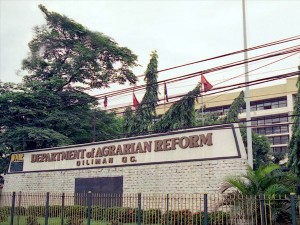MANILA, Philippines–What happened?
The Department of Agrarian Reform (DAR) has failed to fully implement two major development projects worth P12.8 billion in farming communities despite the release of funds for the programs, the Commission on Audit (COA) reported.
In its scrutiny of the agency’s financial transactions in 2013, the COA said the DAR did not meet its goal to help alleviate poverty incidence in agrarian reform communities because of the delays in the completion of Agrarian Reform Infrastructure Support Project Phase III (Arisp) and the Agrarian Reform Community Project Phase II (ARCP).
In a report, uploaded to the COA website on Tuesday, the state auditors also found that the DAR had spent P135.7 million for training and consultancy services without a public bidding in violation of Republic Act No. 9184, or the Government Procurement Reform Act.
Italian aid
The COA said the office of Agrarian Reform Secretary Virgilio de los Reyes had failed to submit the “cash programming” for the P2.5-billion Italian Assistance to the Agrarian Reform Community Development Support Program in Mindanao, which caused the delay in the release of funds for the project.
Aided by a soft loan from the Italian government, the project was intended to spur economic development and improve peace and order in 35 agrarian communities in the provinces of Sarangani, Sultan Kudarat, Maguindanao and Lanao del Sur as part of the government’s Millennium Development Goals within a six-year period.
As of December 2013, the COA said none of the deliverables, including the construction of farm-to-market roads and bridges, had been met despite the release of P20.7 million for the project since April 2011.
In the case of Arisp, the COA said the DAR had already spent P7.76 billion out of the P8-billion appropriation for the project, but only 42 percent of the infrastructure projects had been completed.
Loan from Japan
“As such, full attainment of its targets at the end of the project duration may no longer be feasible,” the COA said.
The project, funded primarily by a P6-billion loan from Japan Bank for International Cooperation, was initially programmed to run from August 2007 to August 2014.
But delays in the first two years of the project prompted the DAR to request the National Economic and Development Authority to extend its life until August this year.
With the help of the National Irrigation Administration, the Department of Public Works and Highways, local government units and other project partners, the DAR was tasked as lead agency for the undertaking to help improve the income of farmer-beneficiaries through the construction and rehabilitation of public infrastructure, and organizing and strengthening peoples’ organizations.
Besides road construction, the funds for the project were earmarked for the putting up of communal irrigation and postharvest facilities, and a supply of potable water.
Only 18 projects done
The project also involved non-infrastructure items, such as agrarian reform information and marketing centers, and the training for the development of cooperatives involved in agribusiness and rural enterprises.
The COA said out of the 34 projects it inspected, only 10 had been completed or operational, 2 were completed but were not operational, while 19 other projects were still in the pre-implementation stage.
Three projects, supposed to be implemented in 2013, had yet to start as of last year, it added.
“From the auditor’s point of view, project completion/progress thereof is a tangible thing. While (the DAR) considered the transfer of funds to the implementing agencies or the conduct of procurement as an accomplishment, the project does not exist yet,” it said.
While it considered the explanation of the DAR officials for the delays in the project, the COA said the agrarian reform department should have been able to address these issues “considering that this is the third phase of the Arisp project.”
“(P)roblems encountered in the earlier projects should have been given solutions and resolved for the smooth implementation of the current project,” it said.
“Problems encountered during Phase I and II should have been ironed out and used as guiding tool on the same problems that have arisen in the implementation of Arisp III,” the COA noted.
As to the implementation of ARCP, the COA discovered that DAR had used up P3.6 billion out of its P4.8-billion allocation, but only 2.25 percent of the foreign-funded project had been completed since it was started in March 2009.
Commitment fees, bonus
State auditors said the government had to pay P14.8 million in “commitment fees” because of the delay in the use of the loan proceeds from the Asian Development Bank and the Organization of Petroleum Exporting Countries Fund for International Development.
The COA said the DAR also illegally used P3.6 million from the funds of the project for the bonus, medical benefits and clothing allowance of its personnel in violation of the Department of Budget and Management Circular No. 2010-001.
RELATED STORIES
Aquino asked to reform DAR to complete agrarian reform targets
In Quezon town, land reform is incomplete
